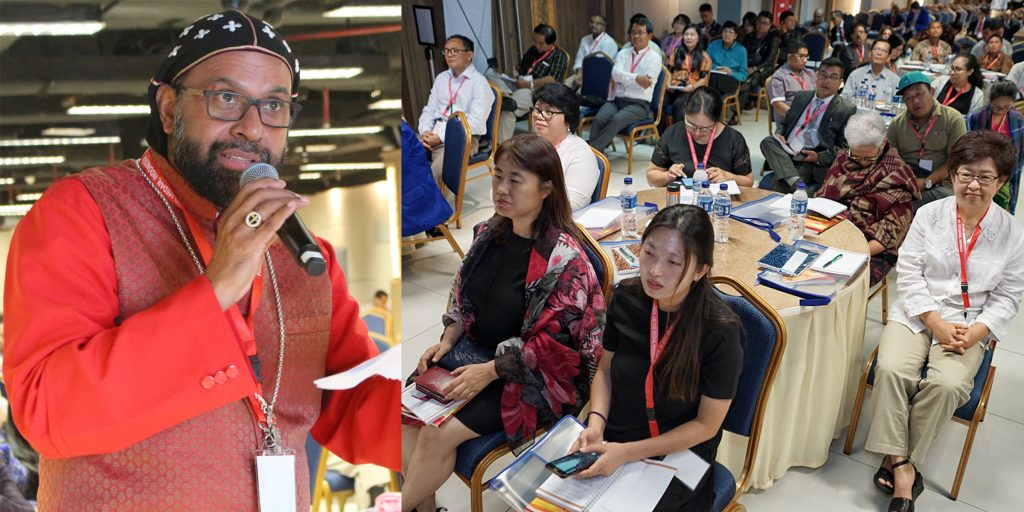“Reconciliation is the objective work of God through Christ to re-establish the broken relationship,” says Orthodox theologian Dr Kuriakose Mor Theophilose

The first day of the Congress of Asian Theologians being held in Medan, Indonesia witnessed varying reflections on the theme, ‘Reconciliation, Renewal, and Restoration: Divine Imperative and Human Indicative’.
Delivering the first thematic presentation, Dr Kuriakose Mor Theophilose Metropolitan, a prominent Orthodox theologian and a member of the Faith and Order Commission of the World Council of Churches, reminded the Asian theologians, “Reconciliation is often confused or minimized to the realm of simple forgiveness; but reconciliation is not just forgiveness, it is the objective work of God through Christ. Forgiveness is an internal process where we work on the hurt, and gain and rebuild a sense of safety and comfort whereas reconciliation is an interpersonal/communal process to re-establish broken trust or relationships.”
He also spoke about the equation between God and humans, where the ‘indicative’ represented ‘objective facts of the God side of the equation’, and where the ‘imperative’ represented the mandate upon humans to live in a certain way, the ‘human side of the equation’.
Metropolitan Dr Theophilose further added, “The liturgy has a huge symbolical relativity with nature and fellow creations of this planet. While the Bible and the Church affirm that creation is a place where the glory of God is displayed, these ideas must be practically implemented in the context of ecological crises in the developing world. The cosmic liturgy, along with the orthodox concept of liturgy after liturgy, can be a clarion call to the atrocities against creation.”
He also elucidated the relationship among theosis, henosis, and kenosis, and their significance.
Metropolitan Mor Theophilose ended by affirming, "The Triune God is constantly active in reconciling, renewing, and restoring God's creation. Affirming the divine indicative manifested from the beginning of creation, and asserting the right of fellow beings and the rest of creation to live in the fullness of life, let us purify our minds and history; and let us continue our pilgrimage based on the values of the Kingdom of God."
"Our churches, societies, and world are sick and fragmented by the wounds of divisions and alienations. Let the divine indicative challenge us to the transforming powers to heal the wounds and to partake in the restoring work of God," Metroplitan Mor Theophilose concluded.
Rev. Dr Ji Zhang of the Uniting Church in Australia, who moderated the session, likened the concept of reconciliation to the Chinese principle of ying and yang where the Spirit is all, and in all.
Dr Zhang said, “All damage in the world can be boiled down to the rejection of the other based on self-interest. However, we are called to remember that personal salvation and salvation of the world cannot be separated. The mother of all things is Tao. Therefore, how can we turn against Mother Nature? The worldview of the West places humanity above creation, but it is important to stress that Asian theology places humanity below creation - as its caretaker and its steward.”
In a panel discussion session held in the afternoon on the topic ‘Our Stewardship on God’s Creation: Ecological Justice’, Rev. Dr Joel Za Hlei Kap, Prof. Suning Siwa, and Prof. Dr Mathew Chandrankunnel made presentations on three different aspects of the topic.
Sharing situations from his local cultural contexts, Dr Hlei Kap said, “The traditional ways of life of the ethnic minorities in Myanmar reflect their concept of spirituality; their ways of daily living and spirituality are not separate entities. The most significant problems in Myanmar are associated with landlessness, rural poverty, and inequality of access to resources, and these issues can be traced to power, policy, and wealth.” He emphatically said that ‘ecological security preceded national security’.
Prof. Suning Siwa, a Taiwanese indigenous woman theologian, delivered an emotional address on the issues of loss, change, and the identity crisis of Taiwan’s indigenous people. She spoke about the deep and enduring influence of colonialism on the identity of indigenous people. Prof. Siwa further said that the villages in Taiwan adhere to the ideas of sustainability and integrity of creation.
Roman Catholic priest Dr Mathew Chandrankunnel spoke about the responsibility of humans exhorted for a paradigm shift from Homo Faber towards Homo Custos.
“As guardians of the cosmos, humans are co-existing and pro-existing with other beings; and have the great role to play as the guardians, custodians, shepherds endowed with an ecological intelligence, ecological mindfulness and an ecological consciousness to ensure harmony of all God’s creation. As created in the image of God, human being is the catalyst and the reconciler who could very well bring together the whole of creation,” stated Dr Chandrankunnel.
The panel discussion spurred several responses. Rev. Dr Margaretha Hendriks, a theological educator from Moluccas Island in Indonesia, beautifully summed up the presentation by saying, “Ecological injustice is very much caused by a paradigm that we have developed – and this is a dualistic kind, where human beings falsely believe that we are ‘better’ or ‘superior’ to nature; this then leads to the neglect and destruction of nature.”
Prof. Dr Mammen Varkki, a lay theologian from India, shared an insight on the reinterpretation of the first verse of the Bible. “Creation is not making or manufacturing. Creation is the sharing of the self. We must re-understand the universe in a different way. We are all part of the self of God,” Prof. Varkki added.
The participants were divided into five groups for workshops on ‘Emerging Concerns in Asia, and Theological Responses’. These themes included, ‘The Ethics of Sustainability and Development’; ‘Reconciliation and Restoration of Broken Relationships among People and Nations’; ‘Restoring the Dignity and Rights of the Stateless, Trafficked, and Marginalised’; ‘Threat to the Fullness of Life: Challenges of Post-Humanism’, and ‘Prioritising Eco-Ethics from an Ecumenical Perspective’.










